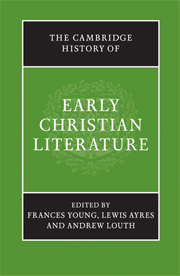9 - Christian teaching
from B - CONTEXT AND INTERPRETATION
Published online by Cambridge University Press: 28 March 2008
Summary
The literary deposit of early Christianity is most often used as source material for tracing the development of doctrine. But religion in the ancient world was not dogmatic. The Latin words religio and pietas referred to the obligations a person owed not merely to the gods but also to society, to parents and family; the Greek word ευσεβεΙα meant offering respect to divinities through customary rituals. Traditional practice was far more important than belief or unbelief. This was true for Jews as well as Gentiles. In the second century Christians were accused of being atheists because they withdrew from conventional religious practices.
Dogmata or doctrina (both words meaning ‘teaching(s)’) belonged not to religion but to schools, and it was the philosophical schools which principally generated doctrine, whether about metaphysics or morals. Philosophers might debate the existence and nature of the gods, but on the whole endorsed convention. Thus, apart from the Epicureans, they avoided the accusations faced by the Christians. The Christian retort was to attack false gods and claim that they worshipped and obeyed, in a rational and moral way, the one true God, the divinity philosophers acknowledged but in their case with no practical consequences. Only through the Christian claim to teach the truth were religious practice, ethics and doctrine integrated and dogma made central to religion. Within the social context of the ancient world, the placing of literature at the heart of the community’s activities also suggests something more like a school than a religious gathering.
Information
- Type
- Chapter
- Information
- The Cambridge History of Early Christian Literature , pp. 91 - 104Publisher: Cambridge University PressPrint publication year: 2004
References
Accessibility standard: Unknown
Why this information is here
This section outlines the accessibility features of this content - including support for screen readers, full keyboard navigation and high-contrast display options. This may not be relevant for you.Accessibility Information
- 36
- Cited by
